 Now I know that you fear God, since you have not withheld your son. Genesis 22:12
Now I know that you fear God, since you have not withheld your son. Genesis 22:12
Because you have done this and have not withheld your son. Genesis 22:16
I wouldn’t have done it. Wouldn’t do it. It’s not in my nature.
What’s not? Generosity.
There it is. I said it. If you want to stop reading now, fine. Why should I expect you to read further, given that reading is an act of generosity giving attention to someone else’s sentences. If I, the writer, am not generous, how can I expect you to be?
“Take your son . . . and offer him as a burnt offering.” A test. That’s what this is. God testing Abraham.
This test, what’s the reward for passing it? Does Abraham, who isn’t afraid to question God (remember Sodom and Gomorrah?), even think to ask?
The Torah, if it knows the answers to these obvious questions (“why” and “how dare you” are two others), doesn’t say. Is its silence a silence of ignorance, or a silence of withholding?
Withholding until Abraham acts or refuses to act. But unlike Abraham in the moment of the testing, we know how the story turns out.
Abraham’s reward (Genesis 22:16 – 18):
I will bestow my blessing upon you and make your descendants as numerous as the stars of heaven and the sands on the seashore; and your descendants shall seize the gates of their foes. All the nations of the earth shall bless themselves by your descendants, because you have obeyed my command.
Had I been in Abraham’s sandals, I wouldn’t have obeyed. And if, God forbid, somehow, by some mysterious power or force one day I am commanded to offer any one of my children (two stepdaughters, one son), I won’t do it, not even if I know in advance the reward.
Not that I’m a rebel—temperamentally disposed to resist or oppose authority. Honestly, I don’t even have the courage to stand up, when I disagree, even strongly disagree, with most human authorities. Agreeable, compliant: That’s me.
But even I have my limits.
You want me to sacrifice my son for the benefit of generations to come? Forget it.
As difficult and painful as it would be for me to refuse an order given by authority, even the Ultimate Authority, a deep parental instinct to love and protect my children, if not selfishness, would prevail.
That’s my son. What’s mine is mine. That’s the voice I listen to. How am I so sure?
Recently, on the first day of a stepdaughter’s visit home, I saw, when I joined her at the Jewish Community Center pool, a copy of Jonathan Lethem’s novel The Fortress of Solitude on her lounge chair. My copy.
It was the first book I read this summer. Reading it, I was transported to the world of its compelling, troubled characters—Brooklyn (where this particular stepdaughter lives), 1970s, crack, tagging, white idealism, experimental art, punk music, and soul. Now that I’ve finished reading it, it means more to me than just its world, its words.
My son turned me onto Lethem, this very novel, though not this particular copy.
My copy I held, lying on the couch, reading for hours and days at the beginning of a summer when I was facing interesting health challenges (I know, you’re tired of hearing about that!). The book, whose characters and experiences, having already entered my son deeply, had now become part of my story as well as the story of my life with my son.
When I saw my book at the pool, out of my house, out of my hands, out of my control, a few feet from splashing water, I tensed up. What if it gets wet? What if its cover is bent, its pages torn? What if it’s never returned to its place on my shelf?
Generosity? Nope. Hold tight onto what’s mine—which includes this very copy of The Fortress of Solitude—or else.
Another example: One morning, driving my wife to her office in the car we let our son drive, I noticed the fuel gauge pointing just a degree or two above empty. How nice it would be for my son if, when he woke up and jumped into the car to dash to his summer job, he were to find the fuel gauge returned to full. Save him some money. And time.
My time. What’s mine is mine. I had an hour or two until he woke up. Precious time when I could sit, pray, write, and read without feeling conflicted by my desire to spend every minute I can with him while he’s home for the summer.
Should I stop at the gas station, right on the way home from my wife’s office, and fill up the car? But, my time, don’t take it away from me!
Last thing my wife said before she got out of the car, “Fill up the car for Gabe.”
My wife’s directive and the opportunity to express my love through a small act of generosity weighed against my fierce desire to protect my time.
My time, my book, my son.
My new fountain pen? Don’t ask to borrow it. My meal? I’m famished; don’t ask for a bite. My white privilege? I can walk into the YMCA locker room without arousing suspicion that I might steal a cell phone from a locker. My golden reputation, earned at work, on campus, and in the community, which entitles me to resources and respect and a certain amount of self-indulgence? I earned this; get your own.
You have not withheld your son. Your favored one, Isaac, whom you love.
With considerable discomfort I let go physically (though not emotionally) of a paperback book that can easily be replaced for ten dollars and twenty cents. And I stopped at Shell to fill the tank.
But my son? Don’t touch him. He’s irreplaceable.
Continued tomorrow.











